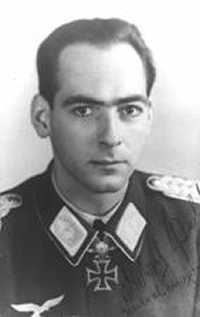Dietrich Peltz
| Dietrich Peltz | |
|---|---|

Dietrich Peltz
|
|
| Born |
9 June 1914 Gera, German Empire |
| Died | 10 August 2001 (aged 87) Munich, Germany |
| Allegiance |
|
| Service/branch |
Army (1934–35) Luftwaffe (1935–45) |
| Years of service | 1934–45 |
| Rank | Generalmajor |
| Unit | StG 2, KG 77 |
| Commands held |
IX. Fliegerkorps II. Jagdkorps I. Fliegerkorps |
| Battles/wars | |
| Awards | Knight's Cross of the Iron Cross with Oak Leaves and Swords |
| Relations | Hans-Karl Stepp (brother in law) |
| Other work | worked for Krupp and Telefunken |
Dietrich Peltz (9 June 1914 – 10 August 2001) was a German World War II Luftwaffe bomber pilot and youngest general of the Wehrmacht. As a pilot he flew approximately 320 combat missions, including roughly 130 as a bomber pilot on the Eastern Front, 90 as a bomber pilot on the Western Front, and 102 as a dive bomber pilot during the Invasion of Poland and Battle of France.
Born in Gera, Peltz joined the military service in the Reichsheer, later renamed Wehrmacht, of the Third Reich in 1934. Initially serving in the Heer (Army), he transferred to the Luftwaffe (Air Force) in 1935. He flew combat missions over Poland and France as a dive bomber pilot. He then converted to the Junkers Ju 88 bomber and was assigned to Kampfgeschwader 77 (KG 77—77th Bomber Wing). With this unit he flew further combat missions in the Battle of Britain. He was awarded the Knight's Cross of the Iron Cross on 14 October 1940. During Operation Barbarossa, the German invasion of the Soviet Union, Peltz was instrumental in developing bombing techniques which allowed precision bombing attacks. This achievement earned him the Knight's Cross of the Iron Cross with Oak Leaves on 31 December 1941. He was then posted to a bomber unit leader's school before he was tasked to form a unit, I. Gruppe (1st group) of Kampfgeschwader 60 (KG 60—60th Bomber Wing), specialized on the use of precision-guided munition against Allied shipping.
...
Wikipedia
